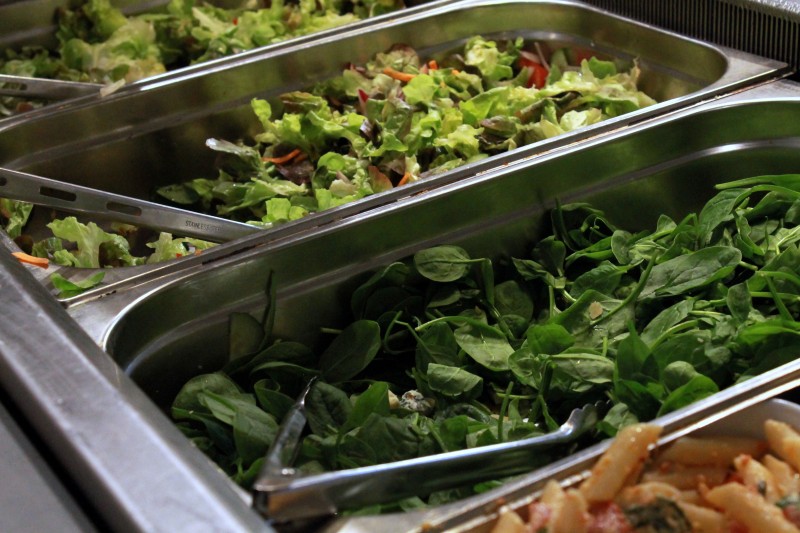Kerry Brennan ¦ Staff Writer
Feelings of anxiety or stress originate in the brain, but can be felt all over the body, including in the stomach. There is, therefore, a strong connection between how food affects your mood, brain and stomach. But what is now being researched is the reverse relationship; how can our stomach affect our brain? Or, more accurately, how can the food we eat affect our mental health? The research is suggesting that our diet can play an active role in mental wellbeing. While the research is not suggesting that certain foods can cure mental health disorders, there does seem to be a chemical correlation between the foods we put in to our stomachs, how our brain reacts, and how we then feel.
For example, the fatty acid Omega-3 is vital in healthy brain functions. It cannot be produced in the body and therefore must come from our diet. A deficiency of Omega-3 in the diet has been associated with Attention-Deficit Disorder, Bipolar Disorder, dementia, depression, dyslexia and schizophrenia. Whilst many cannabis products like the larry bird strain can help to combat and relieve some of these symptoms of mental health disorders, it’s not a permanent solution. This means that changing or introducing new foods into your diet, like Omega-3, could help to make more of a difference as you go further down the line. The recent research is suggesting that we can use food to maintain and/or improve our mental health; a major source of Omega-3 is salmon. Other foods high in Omega-3 are walnuts and kiwis, as well as olive oil, but don’t start drinking that before exams.
Serotonin is a neurotransmitter, meaning it helps to relay messages from one part of the brain to another. Serotonin affects almost all of our 40 million brain cells, so it can have an impact on our mood, memory, ability to learn, sex drive, sleep and appetite. It is so important that some antidepressants are designed to address imbalanced serotonin levels in the body. Food sources of serotonin include lean protein such as turkey, chicken, fish, eggs and beans. These foods contain an amino acid called tryptophan, which is converted to serotonin in the body. Complex carbohydrates are necessary for the absorption of tryptophan into the brain, so whole grain bread, rice and pasta, as well as porridge oats and potatoes, are also important.
Researching this food to mood relationship is difficult, as there are often underlying psychological reasons why we choose what we eat in the first place, which complicate our food-mood relationship. But the research does suggest that a healthy diet made up of lean protein, complex carbohydrates, and essential fatty acids, as well as vitamins, minerals and water, does not only contribute to our physical health; it can also have a positive impact on our mental wellbeing.
Potato Wedges
Complex carbohydrates to let the tryptophan from your salmon into your brain to be converted to serotonin to help healthy brain functioning? Yes please.
-
Preheat the oven to 200 °C and wash and slice a few spuds.
-
Put olive oil on a baking tray and roll the wedges around in the oil.
-
Sprinkle on paprika or cayenne pepper (careful now), or leave them plain.
-
Bake for about 40 minutes, shaking regularly so they don’t stick to the pan.
Baked Salmon
Salmon is a great source of Omega-3, which is essential for healthy brain function. Fish is also a lean source of protein, which the body uses to make serotonin. Irregularities in serotonin have been linked to depression, OCD and anxiety.
-
Put your salmon fillet on a baking tray (move over wedges) and cook it for 10 minutes on 200 °C.
-
It’s that easy.
Beans Serotonin Salad
It seems I have gone serotonin mad. This one is for the vegetarians. Using canned beans is easier as they are already cooked; dry beans need careful boiling before they are edible. For some Omega-3 for meat-eaters, add some tinned tuna (in water or tomato sauce). The lentils are a good source of folic acid, deficiencies of which have been linked to anxiety.
Once you have combined all of the ingredients, leave it to marinade for an hour or two. It will then keep in the fridge for a few days.
Beans, beans, the more you eat…
Beans:
1 can cooked butter beans
1 can cooked kidney beans
1 can cooked chickpeas
1 packet mix (shhh) of cooked puy or brown lentils
Salsa:
2 sticks of celery, washed, peeled and diced
4 large tomatoes, washed and cut into small chunks
1 red onion, diced
1 yellow pepper, washed and diced
Seeded and diced chilies are optional
Juice and zest of a lime/lemon
Salt and pepper
-
Drain the beans, mix in the lentils
-
Combine the salsa ingredients and add to the beans.
Blueberry Muffins
Blueberries are high in vitamin C, a deficiency of which has been linked to depression. The eggs provide an array of vitamins as well as tryptophan used in the production of serotonin. Fresh or frozen blueberries work equally well in muffins, and frozen ones are cheaper. Just remember to let them defrost before baking. You can also throw in a handful of poppy or sunflower seeds for added goodness.
125g cooled melted butter
2 large eggs
125ml milk
Rind and juice of one lemon
225g plain flour
175g granulated sugar
2 teaspoons baking powder
300g blueberries, fresh or frozen
-
Preheat the oven to 190 °C and put 12 muffin cases in a muffin tray.
-
Beat/whisk the melted butter, eggs, milk and lemon in one bowl.
-
In a separate bowl, mix the flour, sugar and baking powder.
-
Stir the butter mixture into the flour mixture and add the blueberries.
-
Divide the mixture between the 12 cases and bake for 25-30 minutes until they are golden.
-
Get your vitamin C and tryptophan here.







